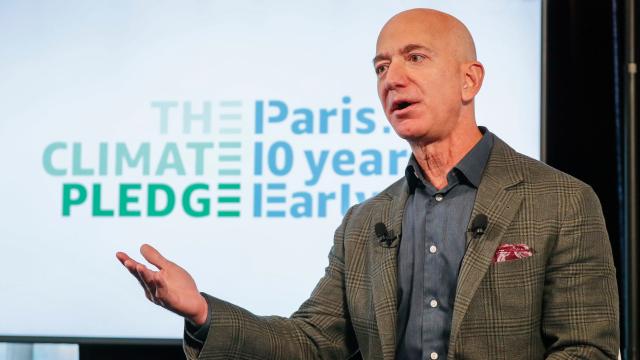This week, the richest man in the world announced that he will give $US10 ($15) billion dollars to the fight to stop the climate crisis. Amazon CEO Jeff Bezos announced his new fund in an Instagram post on Sunday.
“Climate change is the biggest threat to our planet,” Bezos wrote. “I want to work alongside others both to amplify known ways and to explore new ways of fighting the devastating impact of climate change on this planet we all share.”
The details are pretty nonexistent; he didn’t say what the money will fund or how quickly he’ll spend it. But regardless, $US10 ($15) billion is a veritable shitload of money. As Robinson Meyer at the Atlantic wrote, that investment would virtually double the amount American philanthropists spend on climate change. If my dude Jeff spends that sum evenly across 10 years, he’ll be the biggest climate philanthropist in the U.S. by a wide margin. It’s like Christmas came early for climate action!
To which I say, bah humbug.
To be clear, it’s not that I think we can take on the climate crisis without massive investments. Climate action that meets the scale of the crisis will require a radical restructuring of society. We’ll need new grids, new infrastructure, new food systems, and more, and all of that will cost money. It’s also not that I don’t think some of that money should come from Bezos, whose net worth is currently $US130 ($195) billion. I just don’t think Bezos should get to decide how to spend it.
Since the early 1980s, the 400 richest Americans, who constitute the top 0.00025 per cent of the population, have tripled their share of the nation’s wealth. That’s a problem for the climate, and not just because some very rich people have more money to spend on private jet trips and yachts, but also (and more importantly) because concentrating wealth also concentrates political power.
The worst kinds of billionaires wield their wealth and power to buy off politicians and lobby for planet-destroying activities that make them money. The Koch brothers and the Mercers, for instance, have spent tied up in the oil and gas industry.
Compared to them, Bezos seems like a saint. But as my colleague Brian Kahn recently explained, Bezos has profited from that industry, too, because Amazon provides those companies services. It’s in Bezos’ best financial interests to not piss those companies off, let alone threaten their very existence.
That might mean he’ll invest in more carbon offset programs, which don’t actually lower emissions and can be horrifyingly unjust. He also might invest in carbon capture and storage technology, which hasn’t been shown to work at scale or geoengineering technology to block the sun, which can be dangerous. Polluting industries tend to favour these kinds of solutions because they, in theory, would allow them to become carbon-neutral without changing their business models despite the huge societal risks they pose.
But climate scientists”even those who say these tools should be used to fight the climate crisis”say that real climate action will require we rapidly stop extracting and using fossil fuels. Bezos’ fund doesn’t require him to listen to them.
Even if Bezos does fund some good climate work, I still think relying on billionaires to fund climate action is a bad idea. For one, it could force those who accept the money to keep Bezos happy, which may mean, for instance, not calling his company out for threatening to fire workers for speaking out without approval about the need for climate action.
Don’t get me wrong, governments don’t always listen to scientists or workers, either. Just look at our current presidential administration. But at least in government, there are democratically elected leaders who can regulate how climate funding should be spent to protect the interest of the country and the planet. If leaders are doing so in ways we don’t like, we can put pressure on them, and if they don’t respond to us, we can run other candidates to replace them. Those leaders are ultimately accountable to voters.
By contrast, no matter how much money pours into his climate fund side hustle, Bezos’ job isn’t to represent Americans. It’s to be the CEO of Amazon. He’s not accountable to the American people but to his shareholders.
Bezos’ climate fund also reinforces the very idea that billionaires should be able to use their wealth to hugely influence the world. If dude really believes in democracy, he should know how wrong it is for wealth to give him the power to transcend it and make decisions about what the planet really needs.
Luckily, there’s another mechanism we could use to appropriate billions of dollars from Bezos to fund climate action: taxes. Through the 1950s, the U.S. had a top tax rate that exceeded 90 per cent, which is more than double what it is now. In addition to taxing Bezos personally, we could tax Amazon, which the U.S. currently doesn’t do.
That would give us far more than $US10 ($15) billion to fund climate action and make other important investments. And it would do so in a way that doesn’t give billionaires such a giant seat at the table.
